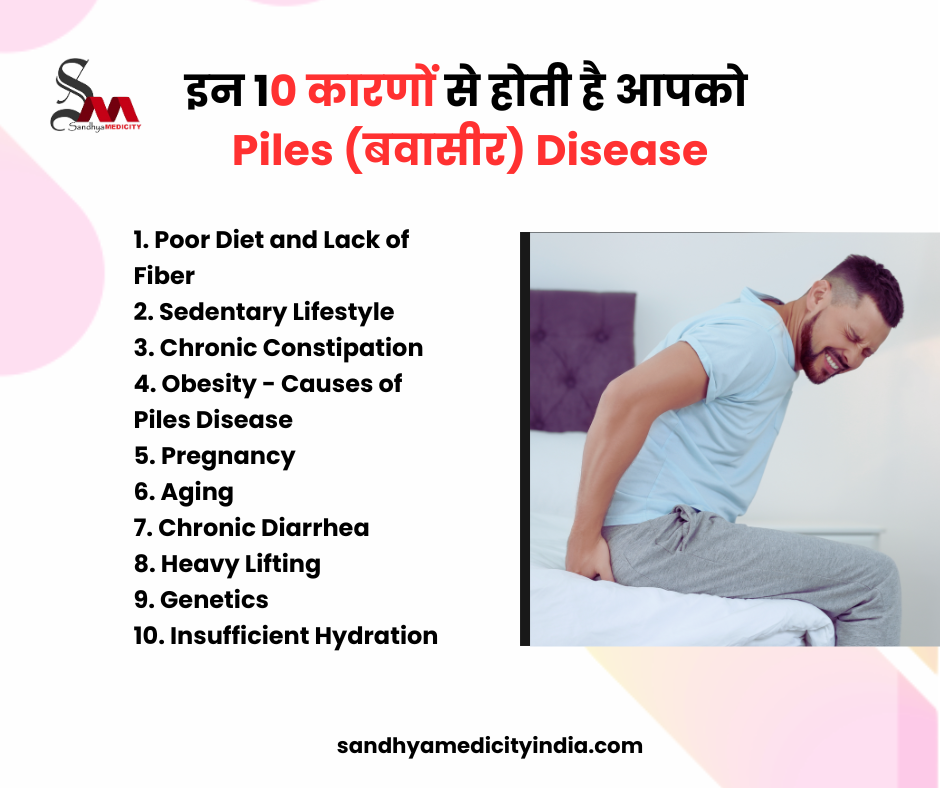Welcome back to our channel, Readers! Today, we’ll be delving into a topic (Causes of Piles Disease) that affects millions of people around the world: piles, also known as hemorrhoids.

Now, before we begin, I want to emphasize the importance of seeking professional medical advice if you suspect you have piles or are experiencing any related symptoms.
Table of Contents
1. Poor Diet and Lack of Fiber
Our first cause of piles is a poor diet and lack of dietary fiber. Many individuals struggle with consuming a well-balanced diet that includes sufficient fiber.
This deficiency often leads to constipation, making it harder to pass stools, adding pressure to your rectum, and potentially causing piles.
2. Sedentary Lifestyle
Another major contributor to piles is a sedentary lifestyle. In today’s modern world, many of us spend countless hours sitting at desks, in front of screens, or engaging in sedentary activities.
Lack of physical activity can lead to poor blood circulation, which can subsequently cause piles to develop.
3. Chronic Constipation
Chronic constipation is yet another leading factor behind piles. When you consistently struggle with passing stools and have to exert excessive pressure during bowel movements, the veins around the rectum can become swollen and inflamed, giving rise to hemorrhoids.
4. Obesity – Causes of Piles Disease
Obesity is not only a health concern in itself but can also contribute to the development of piles. Excess weight puts significant pressure on your abdomen, including the rectal area.
This pressure can weaken blood vessels and contribute to the formation of hemorrhoids.
5. Pregnancy
Ladies, listen up! Pregnancy is a well-known cause of piles. As your body undergoes significant hormonal changes and your uterus expands, it may exert pressure on the veins around the anus, leading to hemorrhoids.
Pregnant women should always consult with their doctors for appropriate management.
6. Aging
As we age, the tissues in our body, including those in the rectum and anus, naturally become weaker. This weakened tissue can contribute to the formation of piles.
Taking proactive measures, such as adopting a healthy lifestyle, can help mitigate this risk.
7. Chronic Diarrhea
While chronic constipation is a known cause of piles, it’s essential to recognize that chronic diarrhea can also lead to the development of hemorrhoids.
Frequent loose stools can irritate the rectal area and cause inflammation, potentially resulting in piles.
8. Heavy Lifting
If your job or daily routine involves heavy lifting or constant straining, you may be at a higher risk for developing piles.
The added strain on the rectal area during this physical exertion can contribute to the formation of hemorrhoids.
9. Genetics
Believe it or not, your genetics can also predispose you to piles. If you have a family history of hemorrhoids, you may be at a higher risk of developing them as well.
This doesn’t mean piles are unavoidable, but it’s important to be aware of this potential risk factor.
10. Insufficient Hydration
Lastly, inadequate hydration is a significant factor that contributes to piles. When you don’t drink enough water, your stools can become hard and difficult to pass, leading to constipation.
Ensure you stay adequately hydrated throughout the day to support smoother bowel movements.
Book Appointment
Related Piles Disease:
- Piles (Hemorrhoids) Disease Treatment
- 5 Best Type of Foods Eat in Piles Disease
- How to Effectively Reduce Piles Fast the Best Ayurvedic Way?
